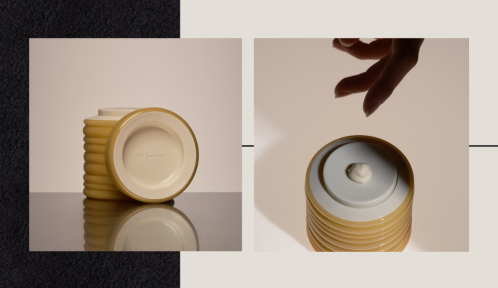Our editors independently select these products. Making a purchase through our links may earn Well+Good a commission
There are some things you can always count on in life: your BFF’s support, Mean Girls references never getting old, and the occasional post-meal bloat. It can happen to anyone, whether you’ve just eaten a massive salad or housed your third can of sparkling water of the day. And regardless of the cause, who wants to feel like they’re bursting out of their pants for the rest of the day?
Experts in This Article
Allison Baker, RD, is a registered dietitian and the founder and CEO of Hazel + Dot Inclusion Consulting. She has previously held roles at Baze Nutrition and at Kroger.
Ayurvedic chef and founder of Divya’s Kitchen
Holly Layer, RD, is a registered dietitian.
founder and chief practitioner of The Juhi Ash Center in New York City
nutrition expert and founder of Solluna
Larissa Hall Carlson is a mindful living teacher, Ayurvedic yoga specialist, Ayurvedic practitioner, end-of-life Doula, Yee yoga teacher, yoga teacher training director, prenatal yoga teacher, and Kripalu Center faculty member.
Richard Firshein, DO, is board-certified in family medicine and is the leading authority in the fields of Integrative, Anti-Aging, and Precision- Based Medicine. He also founded the Firshein Center for Integrative Medicine in New York City.
integrative gastroenterologist, author, and founder of the Digestive Center for Wellness
Bloating—aka when your stomach feels uncomfortably full, tight, and gassy—can happen for a variety of reasons, but food is one of the most common culprits. You can become temporarily bloated after adding too much fiber in your diet at once, for example, or after drinking lots of carbonated drinks (which can create a buildup of gas in the body). Some people with food sensitivities can experience bloating and other digestive upset after eating foods with dairy, gluten, or artificial sweeteners (among other ingredients). (Consistent bloating, on the other hand, may be a sign of a more serious gastrointestinal issue like irritable bowel syndrome (IBS) or small intestinal bacterial overgrowth (SIBO), and should be addressed by a doctor.)
It’s the worst, which is why we tapped seven health experts, from doctors and RDs to Ayurvedic experts, to share their tried-and-true home remedies for bloating. They deal with it sometimes too—but since they know how the body works a bit better than the average person, they have some covetable insider knowledge on how to get rid of it fast. You’ll be feeling back to normal in no time.
1. Blend a green smoothie
Whenever The Bloat Cure author Robynne Chutkan, MD, feels that annoying ballooning feeling starting to creep up in her gut, she uses her blender to make a quick bloat-fighting beverage. “My go-to bloat cure is my Gutbliss green smoothie, made with coconut water, collards, kale, parsley, pineapple, lemon, fresh ginger, and lots of ice,” she says. She drinks it at breakfast and at lunch that day, followed by a light dinner of veggie soup or broth. “By the next morning, fantastic things are happening in the bathroom and my bloat is banished.” Dr. Chutkan says all the glorious fiber in the leafy greens helps move whatever’s sticking around the digestive tract through the colon to the finish line.
2. Nosh on some fennel seeds
Ayurvedic practitioner Larissa Carlson‘s secret bloat-fighting weapon: fennel. “When feeling bloated after a meal, I chew on a half teaspoon of dry-roasted organic fennel seeds,” she says, adding that the small-but-mighty seeds have long been praised for reducing gas and bloating as well as freshening breath. “If you tend to bloat regularly, dry-roast the seeds in a frying pan on low-medium heat, stirring gently until you smell the rich aroma. Then, let the seeds cool and keep in a glass jar,” she says. “After meals, chew and swallow the juice of the seeds—yes, you can swallow the whole seed—to prevent bloating.” When she’s more in the mood to sip on something than to chew it, she brews a fennel tea with cumin and coriander, which she says also helps with bloating.
Chinese medicine expert and The Juhi Center owner Juhi Singh also turns to fennel for beating bloat. “After a meal, chew on a teaspoon of fennel seeds to prevent gas and uncomfortable bloating,” she says. “Chewing on a little ginger or drinking a cup of ginger tea can help with post-meal bloating.”
Constipation can also cause bloating—here’s some intel on foods to help you poop:
3. Give your belly a little massage
Divya Alter, an Ayurvedic chef and owner of Divya’s Kitchen, loves to give herself a little massage to combat bloat. “Lie down and massage your belly clockwise with a few drops of warm sesame oil or ghee,” Alter says. (The sesame oil or ghee help reduce gas-related spasms.) This helps move gas and stool down to the colon—giving it a gentle push in the right direction. “Energetically, bloating is an indication of Vata imbalance—too much air in your digestive system, sometimes moving in the wrong directions,” Alter explains.
4. Go back to the basics: water and walking
Registered dietitian Holly Layer, RD, swears by a simple bloat-busting solution: “When I’m feeling bloated, I make it a point to drink extra water and take a walk after eating,” she says. “The extra fluid actually helps decrease water retention, and movement after eating aids in digestion and simply makes me feel better.” Sometimes the easiest solutions really do work the best.
5. Consider adding a probiotic to your supplement lineup
If you experience bloating on the reg, integrative medicine doctor Richard Firshein, DO, says to consider taking a probiotic or digestive enzyme, which can help your body have regular bowel movements. “Try to make sure you’re regular because constipation can cause many digestive problems, but if fiber is being overly digested by bacteria, it can lead to increased bloating and discomfort,” he says.
Well+Good Wellness Council member and celebrity nutritionist, Kimberly Snyder, CN, says this is what she does, too: “Getting an extra boost from supplements like my SBO+ Probiotics, Digestive Enzymes, and Detoxy+ helps minimize these unpleasant symptoms,” she says. Just be sure to talk to your doctor or other trusted practitioner to make sure you’re picking something that’s right for you.
6. Plan ahead when you know you’re going to eat bloat-causing foods
Allison Baker, RD, is pretty familiar with what will make her feel bloated—for her it’s garlic, onions, and dairy—so she pops a digestive enzyme on the days when she plans on eating those foods. If that doesn’t work, she has a backup plan: “I try to prevent bloating in the first place. But if I do find myself feeling poorly, I find that drinking water, walking or running, and stretching all help alleviate stomach pain,” she says.
However, if you find that you’re constantly bloated (and nothing that you’re trying at home is cutting it), schedule an appointment with your MD. There could be something in your diet that you’re sensitive to that you’re unaware of, or a larger digestive issue at play. Once you pinpoint the problem, you’re well on your way to living your best bloat-free life—you know, at least most of the time.
This article was published on June 5, 2019. It was updated on November 2, 2020.
Oh hi! You look like someone who loves free workouts, discounts for cult-fave wellness brands, and exclusive Well+Good content. Sign up for Well+, our online community of wellness insiders, and unlock your rewards instantly.
Sign Up for Our Daily Newsletter
Get all the latest in wellness, trends, food, fitness, beauty, and more delivered right to your inbox.
Got it, you've been added to our email list.











